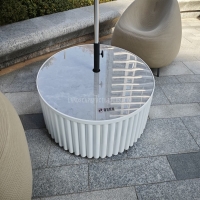Welcome to the website for landscape facilities products and knowledge.
How does the bin’s design ensure it remains unobtrusive in natural or scenic landscapes?
The integration of waste bins into natural or scenic landscapes requires a thoughtful design approach to maintain the beauty of the environment while serving a practical purpose. Modern bin designs achieve this through several key strategies.
1. Camouflage and Neutral Colors: Bins are often designed in earthy tones like greens, browns, or grays to blend seamlessly with their surroundings. This minimizes visual disruption in parks, forests, or coastal areas.
2. Low-Profile Shapes: Instead of bulky, industrial designs, bins in scenic areas feature sleek, minimalist forms that mimic natural elements like rocks or tree trunks, reducing their prominence.
3. Material Selection: Sustainable materials such as recycled wood, metal, or weather-resistant composites are used to ensure durability while harmonizing with the natural aesthetic.
4. Strategic Placement: Bins are positioned discreetly along pathways or near seating areas, ensuring accessibility without dominating the landscape.
5. Eco-Friendly Messaging: Many designs incorporate subtle branding or educational text about environmental conservation, reinforcing their purpose without being visually intrusive.
By prioritizing these elements, bin designs successfully balance functionality and aesthetics, preserving the untouched appeal of natural landscapes while promoting responsible waste management.
Related search:

Recommendation
Round metal tube border design table with tempered glass or granite countertop on the top.